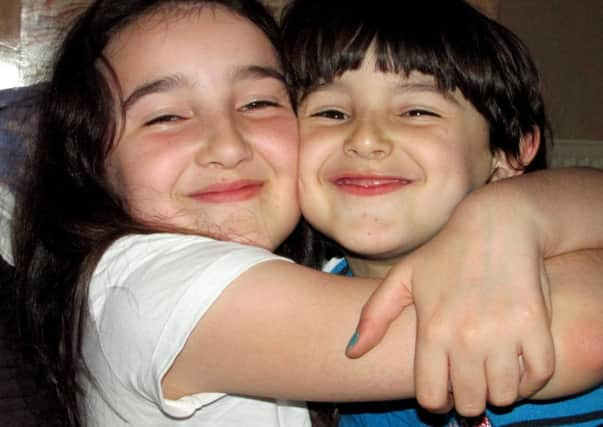A campaign that came from tragedy


“Things most families can take for granted, can make you fraught with worry”.
Over the last two years, Caroline Souyad has made checking food ingredients and the contents of shopping trollies into a fine art. Because she knows if she didn’t, it could have serious consequences for her son Bessam, five.
Advertisement
Hide AdAdvertisement
Hide AdWhen he was two and a half, Bessam suffered a severe allergic reaction - anaphylaxis - to peanut. At the time, Caroline, from Beverley, East Yorkshire, had no idea why Bessam had suddenly become ill, but to the doctor who saw him in A&E, it was immediately obvious.
“I’d been eating toast with peanut butter on, and I must have touched him with some on my skin. Within 20 minutes his face was all puffy, and I couldn’t see his eyes,” Caroline said.
“At that stage I had no idea he had an allergy so I had no idea what was going on, it was scary. We rushed him to hospital and the doctor immediately said ‘peanuts’.”
It’s been a steep learning curve for the Souyads, with Bessam’s allergy, which doesn’t run in the family, requiring strict control over all food in the family home. Now he’s started school, staff are trained at administering an epi-pen should he come into contact with peanuts, and Caroline and her husband Yassine accompany him to any events or parties with friends.
Advertisement
Hide AdAdvertisement
Hide AdThe family now do their food shopping online, as every the ingredients of every item needs to be checked each time it’s purchased, in case changes have been made, and Bessam and his sister Yasmin, 10, are aware of what he can and cannot eat.
Having a child with a severe, potentially life-threatening allergy has had a profound impact on the family’s daily life, and recently Caroline received training from the Anaphylaxis Campaign to set up a support group for parents in the same situation - the first in Yorkshire.
Caroline, 42, said: “It can cause a great deal of stress and anxiety. In the beginning, you worry that anything they eat could threaten their life. As time goes on you have to navigate new challenges all the time – nursery, school, parties, get-togethers with friends and family, travel, even just finding safe food in the supermarket.
“They are all things most families can take for granted, but which are fraught with worry for the parents of an allergic child. Bringing parents together in a support group environment is a great way to share advice, support and experiences with others going through the same thing, and to regain some of the control you feel that you’ve lost.
Advertisement
Hide AdAdvertisement
Hide Ad“As a mother, you worry that you’re being overpossessive, it helps to know that I’m not over-reacting, there are other people in the same situation.”
The group has already met once and a second meeting is planned for Sunday, October 12, 1pm, at Ellie Mai’s Tearoom, Cottingham, and any parents are welcome along.
Mandy East, the Anaphylaxis Campaign’s national coordinator, said support groups were of vital importance to families, especially those with a new diagnosis.
As part of the campaign’s 20th anniversary work this year, it is training people up and down the country to run support groups, and more volunteers are needed.
Advertisement
Hide AdAdvertisement
Hide AdMs East said: “Having a child diagnosed with an allergy has a huge impact on your life, and parents tell us that although family and friends can be well meaning, they really don’t understand what they are going through.
“Any childhood illness is dreadful, but with many, you have treatment options and it can be managed or even get better entirely. That’s not the case with allergies, they don’t get better, and in many cases, they get worse.
“Having someone to talk to is invaluable.”
Food allergies are thought to affect around five to eight per cent of children.
In the year to February 2014, NHS hospitals in England death with more than 20,000 admissions for allergies, and every year around 20 people will die from anaphylaxis.
Advertisement
Hide AdAdvertisement
Hide AdThe majority of these are aged from 15 years old to 24, and the charity is raising awareness among young adults with the allergies that they need to remain vigilant.
“It’s extremely rare for a younger child to die as parents have control over what they come into contact with, but it’s around this age, with teenagers thinking they are invincible, that deaths occur.
“They might be out for a curry or get drunk and not realise what they are eating, and they haven’t told their friends about how to help them.
“As part of our anniversary, we’re really pushing for greater awareness among young pople about the dangers of not taking their allergy seriously.”
Advertisement
Hide AdAdvertisement
Hide AdThe charity is also campaigning for GPs to provide better support for families affected by allergies.
“A lot of GPs will admit they do not know what to do when confronted with multiple allergies,” said Mrs East. “It’s brilliant for us to be able to say to people who call up, distraught and not knowing what to do, that they can contact someone like Caroline who will show them they are not alone.”
• For more information on the Anaphylaxis Campaign’s Allergy Wise training or support groups, visit www.anaphylaxis.org.uk or call the campaign’s helpline on 01252 542029.